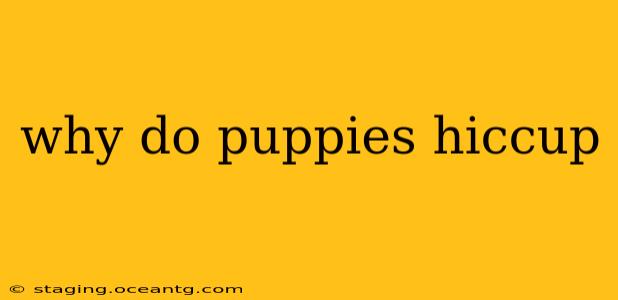Why Do Puppies Hiccup? Understanding Those Little Shakes
Puppies, with their adorable antics and boundless energy, often surprise us with unexpected behaviors. Hiccups are one such phenomenon, leaving many owners wondering about the cause. While a fleeting hiccup is usually nothing to worry about, understanding the reasons behind them can ease your mind and help you recognize when professional veterinary attention might be needed.
What Causes Hiccups in Puppies?
Hiccups, medically known as singultus, are involuntary contractions of the diaphragm, the muscle separating the chest and abdomen. These contractions cause a sudden intake of breath that's abruptly cut short, resulting in the characteristic "hic" sound. In puppies, several factors can trigger these spasms:
-
Irritation of the Phrenic Nerve: The phrenic nerve controls the diaphragm. Anything irritating this nerve, such as swallowing too quickly, eating too much, or even excitement, can lead to hiccups. Think of a puppy gobbling down food too fast—that rapid swallowing action might be the culprit.
-
Overexertion: Just like in humans, vigorous play or exercise can sometimes trigger hiccups in puppies. That energetic romp in the park might be followed by a few hiccups as their little bodies try to catch their breath.
-
Gastrointestinal Issues: In some cases, hiccups can be a symptom of an underlying gastrointestinal problem. Bloating, gas, or indigestion can irritate the diaphragm and trigger those involuntary spasms.
-
Temperature Changes: Sudden changes in temperature can also be a factor. A puppy transitioning from a warm room to a cold environment might experience hiccups as their body adjusts.
How Long Do Puppy Hiccups Usually Last?
Most of the time, puppy hiccups are short-lived, lasting only a few minutes. If the hiccups are mild and infrequent, there's usually no cause for alarm. However, prolonged or severe hiccups could indicate a more serious problem.
When Should I Worry About My Puppy's Hiccups?
While occasional hiccups are normal, persistent or severe hiccups warrant a veterinary checkup. Here are some warning signs to watch out for:
-
Hiccups lasting longer than an hour: Prolonged hiccups can be a sign of underlying issues.
-
Hiccups accompanied by other symptoms: If your puppy is also exhibiting vomiting, diarrhea, lethargy, or difficulty breathing, seek immediate veterinary attention. These symptoms suggest a more serious problem.
-
Frequent or recurring hiccups: Regular episodes of hiccups could point to a persistent issue requiring veterinary diagnosis and treatment.
Can I Do Anything to Help My Puppy Stop Hiccupping?
For short-lived hiccups, there's usually no need for intervention. However, if you're concerned, you can try a few gentle approaches:
-
Distraction: Try diverting your puppy's attention with a favorite toy or a small treat. Sometimes, a change of activity can help stop the hiccups.
-
Gentle Massage: A gentle massage of the puppy's belly might help soothe the diaphragm. Be sure to use a light touch and stop if your puppy seems uncomfortable.
My Puppy Has Hiccups, But No Other Symptoms – Should I Still Take Them to the Vet?
While infrequent, short hiccup episodes are typically harmless, it's always best to err on the side of caution. If you have any concerns, it’s always advisable to contact your veterinarian. They can offer professional advice and rule out any underlying health problems. Don't hesitate to reach out—your vet is there to help keep your furry friend healthy and happy.
